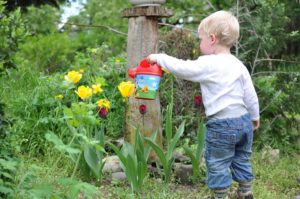
Teaching kids how to garden is easy when you remember these six tips.
Gertrude Jekyll, a British horticulturist, and garden writer, wrote that a garden “teaches patience and careful watchfulness; it teaches industry and thrift; [and] above all, it teaches entire trust.” These are admirable character traits that we want our children to carry through life. Teaching kids to garden can also encourage conservation practices and respect for nature. Most importantly, however, gardening with kids is fun! Children are naturally curious and enjoy simple tasks like planting seeds or digging for earthworms. Gardening doesn’t need to be expensive, complicated, or time-consuming. By committing a handful of minutes each week to gardening with your child, you can grow a beautiful new garden project. The following tips will help you get started.
Start Small
Teaching kids how to garden doesn’t require a large yard. Small and simple is often better, because kids will feel less overwhelmed. A few small projects include:
- Planting beans or sunflowers in cups on or near a sunny windowsill
- Growing a potted tomato plant on your patio
- Growing flowers in a window garden box
These simple projects are useful for teaching kids how to garden by illustrating the importance of the basics: healthy soil, sunlight, and water. As your child gains interest and experience, you can graduate to a small vegetable or flower garden.
Choose High-Interest Plants
To help encourage your child’s interest in gardening, let them decide which plants to grow based on which part of gardening interests them. They may enjoy cherry tomatoes, which make for a tasty snack. Lettuce and spinach also grow fast and can be harvested more than once. You could also grow a giant pumpkin to enjoy by Halloween. If your child loves flowers, you can consider planting quick-blooming annuals like snapdragons, marigolds, or petunias.
Use the Right Garden Tools
Every gardener needs high-quality tools to do their work correctly. When you begin teaching your kids how to garden, you should also supply them with a child-size shovel and hoe, along with durable gloves. However, don’t buy plastic “toy” tools, as these are not suitable for real gardening projects.
Cultivate Good Habits
Like any activity, gardening success has as much to do with consistency as it does with skill. It is equally important when teaching kids how to garden to teach them good habits. For instance, make sure they store their tools after each use. Set aside a regular 15 to 20 minutes each week to tend to their garden, in which you search for weeds and pests. These bite-sized lessons in responsibility and organization will benefit children greatly.
Enjoy the Fruits of Your Labors
Children can get a first-hand experience of the food cycle when their plants appear on their dinner table. You can use the fruits or veggies you’ve grown to cook a tasty meal with the help of your child. For instance, you can:
- Make pizza with fresh tomatoes and basil
- Scrubs carrots for a quick snack
- Slice strawberries for your breakfast cereal or oatmeal
You can also encourage more good habits by sharing your surplus vegetables with a food bank.
Visit a Farm or Farmers Market
By teaching kids how to garden, you are also teaching them where their food comes from. You can continue this education by taking your kids to visit a farm or farmer’s market to help them understand even more how food gets grown, sold, and eaten. Additionally, they will develop an appreciation for the Earth and for the farmers who work hard to produce delicious foods.
Consider Before Planting
As you plan your gardening lessons, it is essential to remember the following factors:
- The growing season and climate of your local area
- Choose plants known to grow well in your area
- Plan according to your schedule
By starting small, your child will quickly find success in their new garden and will likely develop an enthusiasm for the joys of the natural world.
Scientific Plant Service Is Your Go-To Source In Landscape Healthcare
Scientific Plant Service, located in Baltimore, is a privately owned corporation, chartered in Maryland in 1957 by Frank J. Burke. We started as a full-service Arborists specializing in the care of shade trees and ornamental shrubs, but today we are a Lawn Care company that is a huge part of the community. From aquatic environments and snow management to deer and mole control, SPS has services tailored specifically for your lawn and landscape.
We offer services in Maryland, Washington, DC, and Virginia, including: Harford, Baltimore, Carroll, Frederick, Howard, Anne Arundel, Montgomery, Prince Georges, Talbot, Queen Anne’s, Calvert counties in MD, as well as Loudoun County, Fairfax County, Arlington, Alexandria, and Falls Church in VA. For more information, contact us online, or call us at 410-321-0970. Be sure to follow us on Facebook, Twitter, LinkedIn, and Pinterest!

